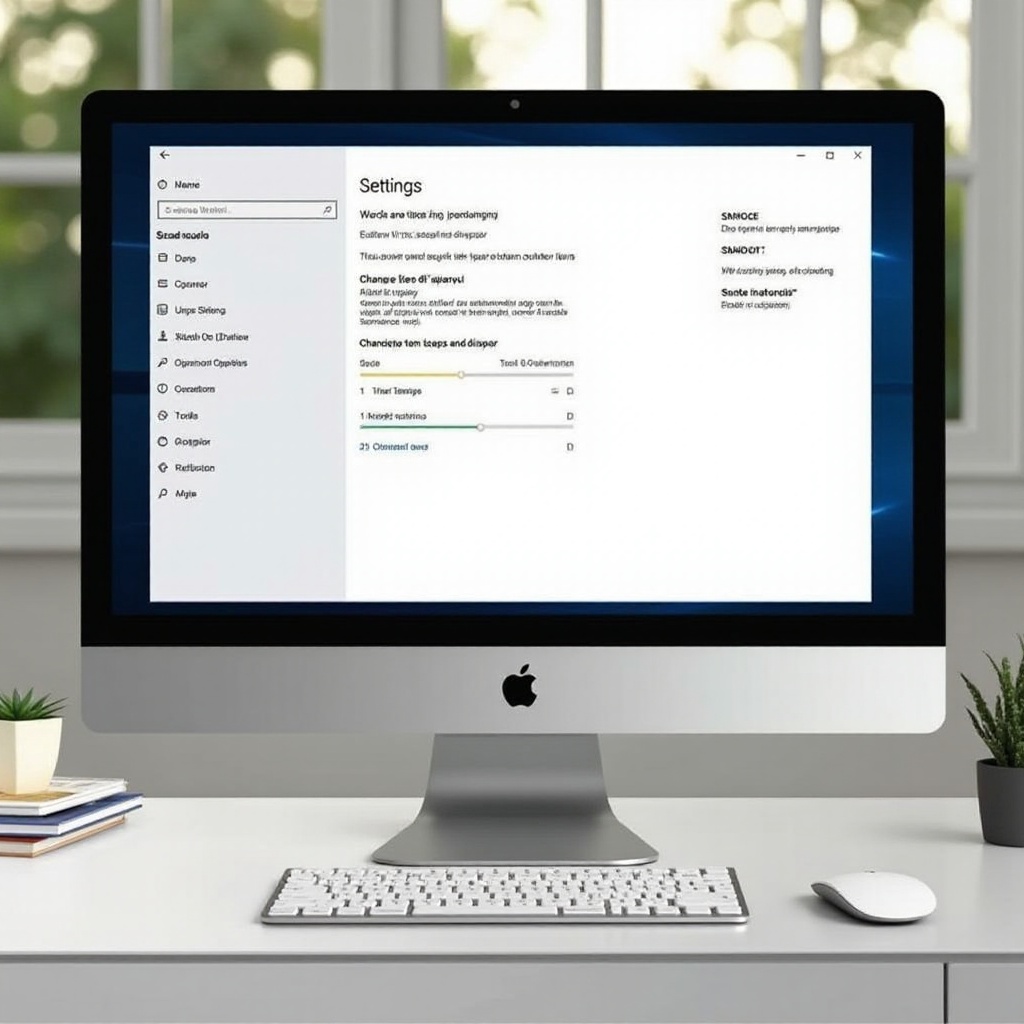How to Make PC Font Bigger: A Step-by-Step Guide
Introduction
Having the right font size on your PC can significantly enhance your user experience. Small text can be straining on the eyes, making daily tasks difficult. Whether you're using Windows 10 or Windows 11, there are multiple ways to increase the font size and improve readability. This guide will walk you through the steps to adjust the font size on your operating system and specific applications, as well as through the use of accessibility tools.

Adjusting Font Size in Windows 10 and Windows 11
Accessing Display Settings in Windows 10
To start, right-click on your desktop and select 'Display settings.' This opens the Display panel where you can make various adjustments. Focus on the 'Scale and layout' section to increase the overall font size.
Changing the Scale and Layout in Windows 10
- Under 'Scale and layout,' look for the 'Change the size of text, apps, and other items' option.
- Use the dropdown menu to select a larger scale. Common options are 125%, 150%, or even 175%.
- After selecting the desired scale, your display will adjust automatically.
Navigating Display Settings in Windows 11
In Windows 11, right-click on the desktop and choose 'Display settings' to access similar options as Windows 10. The user interface is slightly different, but the steps are largely the same.
Adjusting the Scale in Windows 11
- Go to the 'Scale and layout' section.
- Use the dropdown menu next to 'Scale' to choose a larger percentage for text and app size.
- Confirm your selection, and the display will adjust to the new scale.

Using the Magnifier Tool for Quick Adjustments
If you need to quickly make the text larger, the Magnifier tool in Windows can be helpful.
Activating Magnifier in Windows
- Open the Start menu and type 'Magnifier' in the search bar.
- Click on the Magnifier app to activate it. You can also use the shortcut Win + Plus (+) to turn it on.
Configuring Magnifier Settings
Once activated, the Magnifier interface allows you to zoom in and out. Adjust the magnification level using the '+' and '-' buttons or the slider.
Pros and Cons of Magnifier Tool
Using Magnifier is quick and easy but it has some downsides:- Pros:- No need to adjust system settings.- Perfect for temporary use.- Cons:- Can be cumbersome for continuous use.- Magnifies everything on the screen, including images and icons.

Customizing Fonts in Specific Applications
Adjusting font sizes in specific applications can be as crucial as making system-wide changes. Here’s how to do it for different programs.
Web Browsers: Chrome, Firefox, and Edge
- Chrome:
- Click the three dots in the upper right corner.
- Go to 'Settings' > 'Appearance' > 'Font size' and select the preferred size.
- Firefox:
- Click the three horizontal lines in the upper right corner.
- Select 'Options' > 'General' and adjust the 'Default font size' under the 'Language and Appearance' section.
- Edge:
- Open settings by clicking on the three dots.
- Go to 'Appearance' and adjust the 'Font size' under 'Customize fonts.
Word Processing Apps: Microsoft Word and Google Docs
- Microsoft Word:
- Highlight the text you want to alter.
- Go to the 'Home' tab and find the 'Font' section to select a larger size.
- Google Docs:
- Select the text to change.
- Use the font size dropdown in the toolbar to increase the font size.
Communication Apps: Email Clients and Messaging Apps
- Outlook:
- Open an email and navigate to 'File' > 'Options.
- Under 'Mail,' find 'Compose messages' and adjust 'Stationery and Fonts.
- Skype and Teams:
- Go to settings and look for accessibility settings to adjust the font size.
Enhancing Accessibility Settings for Better Readability
Besides making changes to the font size, you can improve readability using accessibility settings.
Using High Contrast Themes
High contrast themes can make text stand out better:- Go to 'Settings' > 'Ease of Access' > 'High contrast.- Choose from available themes or create a custom one.
Enabling Text Suggestions and Narrator
These tools can further assist with readability:1. Text Suggestions:- Enable under 'Settings' > 'Devices' > 'Typing.2. Narrator:- Activate by pressing Win + Ctrl + Enter.- Adjust settings in 'Settings' > 'Ease of Access' > 'Narrator.
Third-Party Accessibility Tools
Third-party tools can offer additional functionalities:- ZoomText: Magnifies text and provides speech output.- NVDA: Primarily a screen reader for visually impaired users.
Conclusion
Adjusting font sizes on your PC to meet your personal needs is essential for a better user experience and enhanced productivity. Windows 10 and Windows 11 offer multiple ways to make these adjustments, from system-wide scaling to specific application settings. By utilizing built-in and third-party accessibility tools, you can further optimize the readability of your screen. Regularly updating and customizing these settings ensures your PC remains comfortable to use.
Frequently Asked Questions
How do I make the font bigger on my PC screen permanently?
To make the font permanently bigger, adjust the scale in the Display settings of Windows. This applies across the entire system and persists through reboots.
Will increasing font size affect the performance of my PC?
Increasing the font size by adjusting the scale does not significantly impact PC performance. However, using third-party magnification tools may use additional system resources.
Can I adjust font size individually for different applications?
Yes, many applications like web browsers and word processors allow you to adjust the font size within their specific settings without changing system-wide settings.




